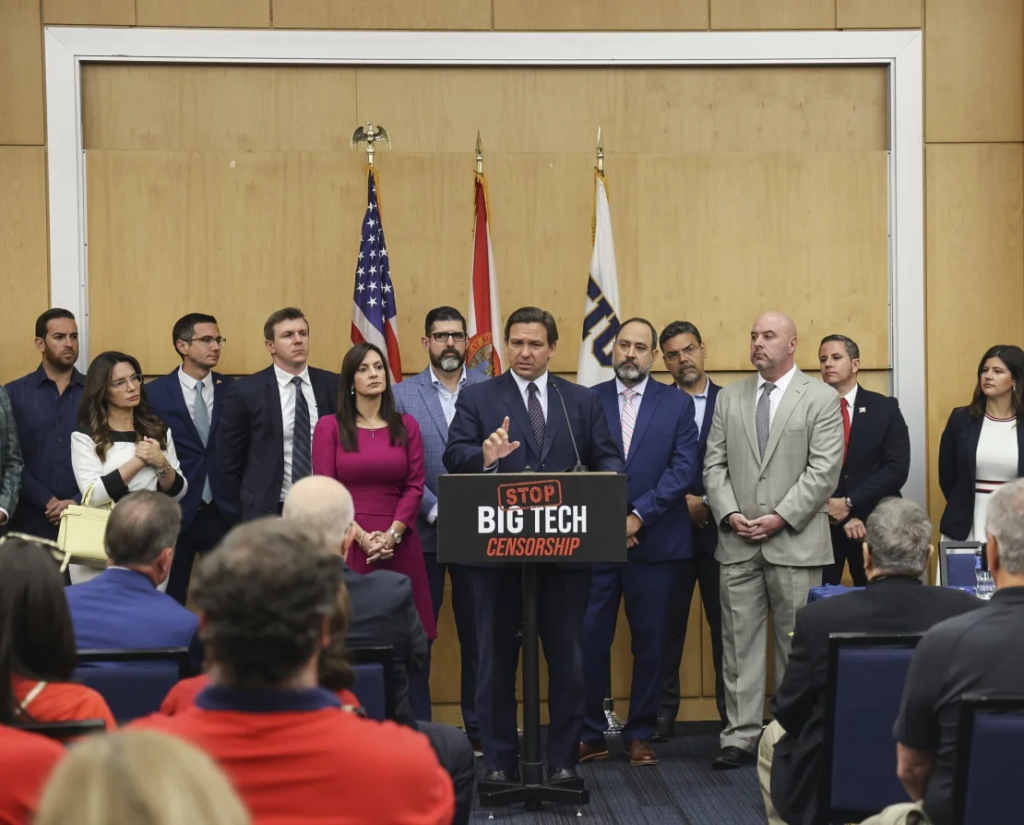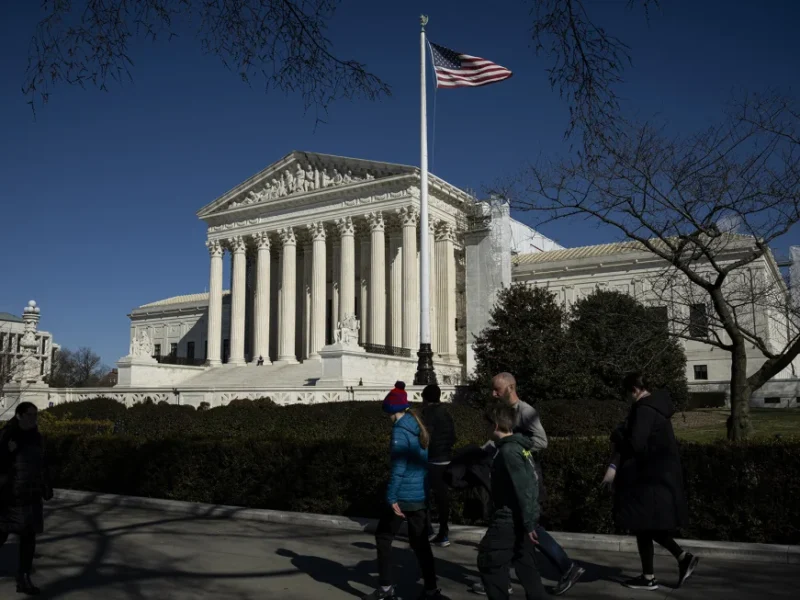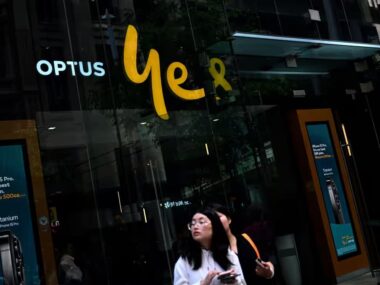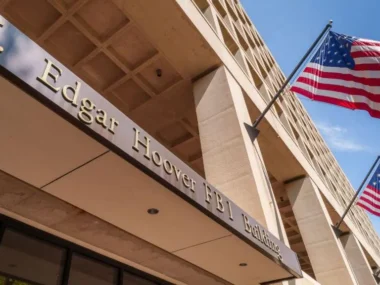The US Supreme Court is poised to render a critical judgment regarding the content accessible to Americans on social media, as it prepares to deliberate on two cases this week that have the potential to reshape the online landscape.
During Monday’s session, the court will examine arguments concerning whether Texas and Florida should be granted substantially greater authority over social media platforms and the content they host, underscoring the profound significance of these services in contemporary American society.
At the heart of the issue lies the question: Should these platforms retain the autonomy to determine the content permitted on their platforms and what should be removed?
The states are advocating to prevent platforms like Facebook, TikTok, and YouTube from deleting users’ posts, even those that may promote hate speech, disseminate misinformation about elections, or endorse harmful behaviors like eating disorders. However, this effort is facing a challenge in light of the First Amendment.
A ruling in favor of the states could potentially alter how information about the upcoming 2024 elections is disseminated across various platforms, from Instagram to others. Officials from Texas and Florida argue that their laws, which impose limitations on content moderation, are constitutional because they aim to regulate the business practices of social media platforms rather than their freedom of speech. Nevertheless, opponents, including NetChoice, an industry association that is suing to oppose both laws, argue that these laws violate the platforms’ own First Amendment rights and could lead to significant unintended consequences due to their broad scope.
For instance, a coalition of political scientists has informed the court that these laws essentially compel platforms to treat “dangerous and violent election-related speech” on par with harmless speech and fail to grant social media platforms adequate latitude to address threats against election officials through moderation.
Does constitutional law permit the restriction of content moderation?
The Supreme Court’s proceedings on Monday in the cases NetChoice v. Paxton and Moody v. NetChoice will determine the permissibility of states enacting laws to prevent social media companies from censoring or removing user content that violates platform guidelines.
These state laws also grant individuals the ability to file lawsuits against technology firms for alleged breaches.
Although broadly drafted, officials from Florida and Texas assert that these laws aim to prevent social media platforms from unfairly censoring conservative viewpoints. Social media companies have consistently maintained that they do not discriminate against right-wing expression.
Enacted by Governor Ron DeSantis in 2021, Florida’s SB 7072 prohibits tech platforms from suspending or banning accounts of political candidates within the state, with potential penalties reaching up to $250,000 per day for violations. Additionally, it empowers individual social media users to sue platforms if they perceive unjust censorship or “deplatforming.”

On Monday, May 24, 2021, Florida Governor Ron DeSantis delivered his introductory speech surrounded by members of the local state delegation before signing legislation aimed at penalizing social media platforms for censoring conservative viewpoints. The signing took place inside Florida International University’s MARC building in Miami.
In 2021, Governor Greg Abbott signed the Texas law, which prohibits large social media platforms from engaging in actions such as blocking, banning, removing, or discriminating against expressions. Similar to the Florida law, Texas’ HB 20 allows individual internet users to take legal action against social media platforms for alleged infringements.
The states argue that social media platforms have become akin to public squares, necessitating new legislation to ensure adherence to free speech principles, despite the First Amendment traditionally applying to governments rather than private entities.
Conversely, the tech industry contends that these laws violate the companies’ own First Amendment rights to determine acceptable speech on their platforms. Courts at lower levels have reached differing conclusions on this matter.
In a case concerning the Texas law, the US 5th Circuit Court of Appeals ruled in 2022 that social media platforms do not possess an unrestricted First Amendment right to censor user content.
However, in the same year, the 11th Circuit Court of Appeals determined that Florida’s restrictions are likely to violate the First Amendment, reasoning that governments cannot compel social media platforms to express certain viewpoints, even if conveyed through posts by third parties.
Now, the Supreme Court has the opportunity to definitively resolve this ongoing debate.
Do tech firms resemble publishers or public utilities?
The NetChoice cases highlight a significant divide in perspectives on social media. Advocates for the state laws contend that social media platforms should facilitate unrestricted speech without assessing its content. Conversely, opponents argue that platforms possess the authority to determine the content they choose to display.
Over a dozen states, led by Republican attorneys general, have urged the Supreme Court to support the legislation in Texas and Florida, asserting that social media companies function similarly to utilities like the phone network and should be subject to comparable regulation.
Former President Donald Trump, in his own submission to the court, likened social media platforms to transportation and communication entities such as airlines, telegraph companies, or railroads.
However, social media companies more closely resemble newspapers and cable providers, which have the discretion to curate their content, and they are afforded the same constitutional protections against government speech mandates as these industries, as stated in a filing by the Biden administration last year.

In January 2022, a passerby utilizes a smartphone in front of a store in Walnut Creek, California.
If implemented, the state laws would result in “absurd outcomes” because they could provide scammers, trolls, and hateful extremists with a pretext to inundate websites with allegations of censorship, according to the Electronic Frontier Foundation (EFF), a consumer advocacy organization.
The EFF described the Florida law as “a significant setback to anti-spam efforts,” as every attempt to restrict the dissemination of spam messages might be construed as an impermissible “shadow ban” under the legislation.
David Greene, senior staff attorney and civil liberties director at the EFF, emphasized the importance of allowing social media platforms to conduct content moderation free from government intervention, asserting that this ultimately benefits internet users. By granting platforms First Amendment rights to curate user-generated content, they can establish distinct forums accommodating diverse viewpoints, interests, and beliefs.
The Supreme Court’s ruling in the NetChoice cases could have broader implications beyond individual websites. A decision favoring Texas and Florida might alter a longstanding precedent prohibiting governments from compelling speech, which entails forcing private individuals to express views against their will. For instance, a 1974 case determined that a Florida law mandating newspapers to publish a political candidate’s speech violated the First Amendment.
Critics of the Texas and Florida laws argue that compelling social media companies to publish all speech, even content they prefer to remove, constitutes compelled speech and a significant departure from First Amendment principles. This could potentially lead to the type of government interference the First Amendment aims to prevent, according to the Reporters Committee for Freedom of the Press.
The group emphasized in a brief that the larger the platform the state seeks to regulate, the greater the state’s influence on public and political discourse would be.











